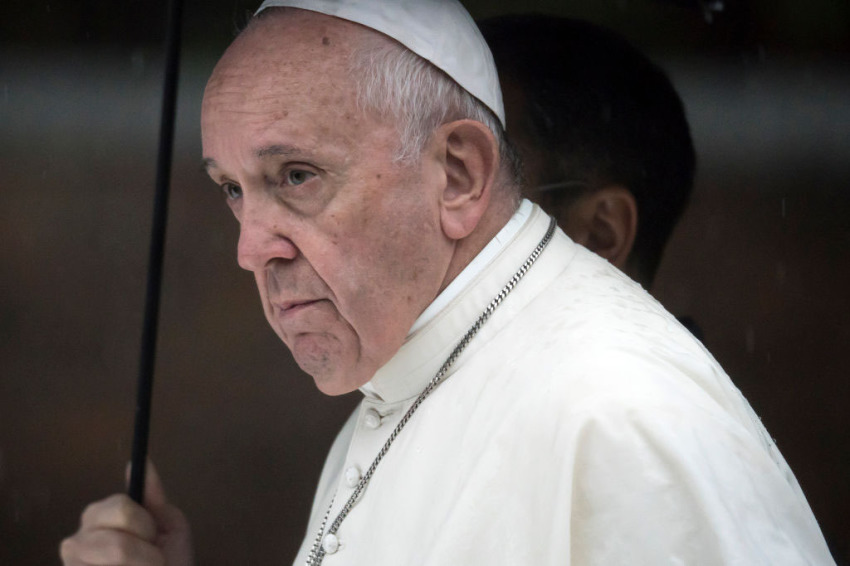Pope Francis criticizes couples who adopt pets instead of kids amid 'demographic winter'

Pope Francis has weighed in on the “demographic winter” plaguing the Western world, taking issue with the idea that couples adopting multiple dogs and cats can replace having children.
During a general audience Wednesday, the pontiff lamented the phenomenon of declining birth rates and criticized what he considered “a certain selfishness” pervasive in society today.
“The other day, I spoke about the demographic winter there is nowadays, in which we see that people do not want to have children, or just one and no more,” he said, according to an English translation provided by the Vatican. “And many, many couples do not have children because they do not want to, or they have just one — but they have two dogs, two cats. … Yes, dogs and cats take the place of children.”
He contends that “the denial of fatherhood or motherhood diminishes us” because “it takes away our humanity.”
“Fatherhood and motherhood are the fullness of the life of a person,” he said.
While the pope acknowledged that “having a child is always a risk, either naturally or by adoption,” he concluded that “it is riskier not to have them.”
“It is riskier to deny fatherhood, or to deny motherhood, be it real or spiritual,” he said. “But denial, a man or woman who do not develop the sense of fatherhood or motherhood, they are lacking something, something fundamental, something important.”
Pope Francis warned of the long-term implications of declining birth rates.
“Civilization becomes aged and without humanity because it loses the richness of fatherhood and motherhood. And our homeland suffers, as it does not have children, and, as it has been said somewhat humorously, ‘and now who will pay the taxes for my pension, if there are no children?’... [I]t is the truth.”
Western countries, including the United States, continue to experience falling fertility rates, indicating that women have fewer children than in previous generations.
Data from Pew Research Center revealed that the general fertility rate in the U.S. — the number of births per 1,000 women between the ages of 15 and 44 — reached a record low of 59 in 2018.
The general fertility rate has been cut in half since 1960, the height of the post-World War II baby boom, when there were more than 120 births per 1,000 women of childbearing age.
Throughout the same time period, the total fertility rate — defined as a hypothetical measure of the number of children the average woman would have in her lifetime if present fertility patterns persist — experienced a similar decline.
Women in 1960 were expected to have an average of about 3.6 children. By 2018, the expected number of children per woman had dropped to 1.73. The general fertility rate and the total fertility rate in the U.S. reached record lows in 2018.
Provisional data from the U.S. Centers for Disease Control, released in May 2021, showed that fertility rates and overall number of births continued to decrease through 2020. The agency found that the U.S. only recorded 3,605,201 births in 2020, the lowest number since 1979 and a decline of 4% from 2019.
The CDC also noted that the total fertility rate was below the replacement rate, “the level at which a given generation can exactly replace itself” in 2020. The total fertility rate of 1.64 in 2020 was below the replacement rate of 2.1. Decades of statistics back up Pope Francis’ warnings about a “demographic winter.”
According to the CDC, “[t]he rate has generally been below replacement since 1971 and has consistently been below replacement since 2007.”
During his general audience, Francis reflected on “Saint Joseph as the father of Jesus.” He recalled how “in ancient times of the East, the institution of adoption was very common.” He said that Joseph was the adopted father of Jesus, whose true biological father was God.
Francis highlights how Joseph developed a fatherly bond with his adopted son.
“We live in an age of notorious orphanhood, don’t we? It is curious: our civilization is something of an orphan, and this orphanhood can be felt,” he said. “May Saint Joseph, who took the place of the real father, God, help us to understand how to resolve this sense of orphanhood that is so harmful for us today.”
“I think in a particular way of all those who are open to welcome life by the way of adoption,” he continued. “This kind of choice is among the highest forms of love, and of fatherhood and motherhood. How many children in the world are waiting for someone to take care of them! And how many married couples want to be fathers and mothers but are unable to do so for biological reasons; or, although they already have children, they want to share their family’s affection with those who do not have it.”
The pontiff urged people to “to take the ‘risk’ of welcoming children” and stressed that “no one [should] feel deprived of the bond of paternal love.”
Ryan Foley is a reporter for The Christian Post. He can be reached at: ryan.foley@christianpost.com



























